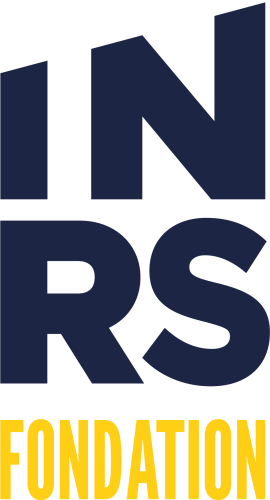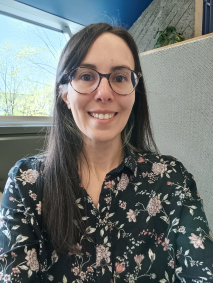Our new INRS Career Transition Scholarship recipient
We are delighted to announce the very first recipient of the INRS Career Transition Scholarship. Karima Gondry Hadria is a professional master’s student in water sciences under the supervision of Professor Anne Crémazy.
Karima returned to university in September 2022, some fifteen years after obtaining her professional degree in analytical chemistry from the Université d’Orléans, in 2008, and following a career as a chemical technician. Our student is currently doing an end-of-master’s internship at the Direction générale de la Coordination scientifique et du Centre d’expertise en analyse environnementale du Québec, Division de la chimie organique du milieu, where she is working on developing a method for analysing perfluoroalkyl and polyfluoroalkyl substances (PFAS) in fish flesh.
Congratulations to Karima Gondry Hadria! A festive award ceremony will be held at the Centre Eau Terre Environnement research and training centre this fall, at which members of the community will have the opportunity to celebrate the success of our scholarship winner.
The Foundation team asked her a few questions to learn more about her return to higher education and her aspirations for the future.
Karima, what brought you to INRS? Tell us about your experience.
I’d been thinking about going back to school for a while, without necessarily taking the plunge. My husband and I decided to come to Quebec because he too wanted to change jobs. I thought that, even if it meant breaking all our habits, it was the right time to go back to university! I chose the INRS course because I found it very much in line with my interests. My first choice was the professional master’s degree, which allowed me to take a number of courses, so that I could brush up on my skills and broaden my horizons. My basic training was in chemistry, so training at INRS was a way of adding multidisciplinarity to my career.
Can you describe the issues and impact of the research presented in your master’s project?
I’m currently doing a professional master’s in water sciences and I’ll be starting a research master’s next September. There is no specific project for the professional master’s degree. As I mentioned above, the challenge for me was to develop multidisciplinary skills related to the field of water and to discover disciplines that I didn’t know. The end-of-term placement is also a plus, because I like being able to apply what I learn in practical terms. My future research project will look at the effects of nickel on phytoplankton in the Arctic Ocean. There are large nickel deposits in the Arctic Ocean, which are increasingly being exploited, but there is a lack of toxicological data for this compound in polar environments. In the long term, the data collected could be used to develop an environmental risk assessment framework for nickel that is appropriate for these ecosystems.
What does winning this scholarship mean to you?
I’m really pleased to have won this scholarship, which rewards atypical career paths. It confirms that my choice was the right one and that my efforts have been recognised! You can stop your studies by choice or because you have to, and sometimes when you want to start again you don’t dare take the plunge, which was my case because of a lack of self-confidence. But, in the end, it’s never too late to start again. I’d even go so far as to say that my professional experience has helped me a great deal in dealing with certain issues, whereas at first you tend to think that the fact that you’ve been out of education for a long time is an obstacle.
“I’m really happy! Thank you to the INRS Foundation and to all the donors! And thank you for your involvement in creating opportunities like this for students.”
—Karima Gondry Hadria, professional master’s student in water sciences
How do you see the future?
I’m currently doing a work placement and my project is on perfluorinated compounds (PFAS), which are emerging chemicals of interest that are in the news a lot at the moment. So I’m still learning new things and I’m really enjoying it. In the fall, I’ll be starting my research master’s degree, as mentioned above. I’m continuing to develop my skills, so that I can identify problems related to water quality and contaminants in the environment in a broader way. As I had hoped when I went back to school, all this new knowledge and experience will enable me to take on new challenges and develop my career in a positive and fulfilling way.
About our Career Transition Scholarship
Created at the initiative of members of INRS senior management, this $5,000 scholarship is intended to recognize atypical career paths and support deserving students who are returning to school after a variety of personal and professional experiences.
Announced in the fall of 2021, this is one of the first new sources of support for the INRS student community created by the Foundation as part of our personalized scholarship program.
The scholarship competition opened in March and closed on 5 April 2023. It was managed by the Service des études supérieures et de la réussite étudiante (SESRE) and attracted a great deal of interest from the student community. The INRS Foundation warmly thanks the SESRE team for its assistance, and the members of the selection committee—Philippe-Edwin Bélanger, Joanie Lavoie, Carolyne Hébert, Steven Laplante, and Annie Castonguay—for their essential contribution.
Thank you to all those who applied, helped publicise the competition and made it run smoothly, and to our generous donors for their invaluable support.
Visit the scholarship directory

